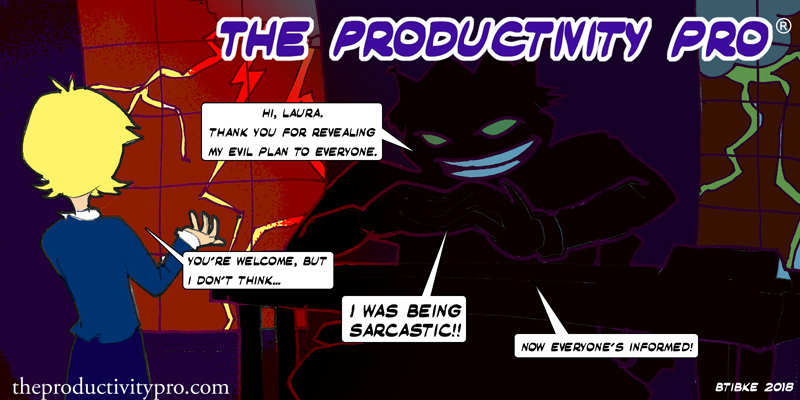
“The minute you settle for less than you deserve, you get even less than you settled for.” – Maureen Dowd, American journalist.
Call them dinosaur-brains or Neanderthals, there are people in every business who live to make us miserable. They aren’t necessarily actively toxic, but some are so rude, bureaucratic, and/or annoying, your automatic response may be to disengage from them and your work. As well all know, disengagement kills productivity.
Hopefully, you’re not the Neanderthal in question. But hey, if you want to send personal and team productivity tumbling, here are four great ways to do it:
-
Micromanage… or ignore. Helicopter managers who hover at your shoulder and control every aspect of your work are foolish, not just because they frustrate others and encourage disengagement, but also because they don’t get their own work done. Alternately, they may waste time redoing existing work—even worse. If you’re not a manager but you still micromanage other people in your work process, that’s just as bad.
But going too hands off can also cause productivity to drop. If, as a manager, you ignore your people or your group adopts the “no manager” holacracy method, engagement may plummet to as little as two percent, according to a recent Gallup survey. Google recently tried a holacracy experiment, but it failed miserably within six weeks. Teams just weren’t producing without managers to guide them, because they felt lost trying to guide themselves. So, before you try a holacracy, give it a second thought. Most of us need a little middle-ground guidance.
-
Skimp on the air conditioning. Back in 2010, scientist Solomon Hsiang reported productivity began to fall in the countries he studied in central America and the Caribbean when the temperature rose above 78°. The average loss was 2-4% per degree of increase, simply because people tire faster when it’s hot. This is just as true in America, as other scientists reported in 2011. Japanese office workers also suffered when heat went up after the Fukushima nuclear reactor shut-down in 2011. Apparently, one of the reasons American productivity skyrocketed after World War II was the availability of air-conditioning.
-
Let annoying distractions get to you. Sartre famously stated, “Hell is other people,” and you know it’s true when your coworkers like to chat in the hallway, listen to their voicemail on speaker, wipe their noses on their sleeves, have terrible BO, play loud music, whistle tunelessly… whatever bugs you. You can accept those behaviors and let them kill your productivity, or you can take action. Some of these examples are hard to handle if you want to be polite, so an anonymous note might be the best solution. You can overcome the other examples with some polite discussion. Otherwise, you can relocate, work elsewhere for a while, or buy noise-canceling earphones and play music of your own.
-
Work too many hours. We organic machines have this really effective self-repair mechanism known as rest. So often, studies have proven long work hours have negative effects, from lowering your IQ temporarily, to risking heart failure. In 2015, John Pencavel of Stanford University released a study demonstrating 50+ hours of work in a week—even spread out over six or seven days—reduces productivity. After 55 hours, the drop-off is so sharp you can put in 70 hours and still accomplish less than with 55 hours. That’s just too obvious not to listen to. If you really want to kill productivity, run yourself ragged.
Sarcasm Will Get You Everywhere
Obviously, I was being snarky when I suggested you sabotage your own productivity earlier in this blog, and then offered “great” ways to do it. Sometimes the cautionary tale teaches better than just telling someone, “Stop it!”, even with an explanation. Productivity can be a precarious thing, but as long as you work hard and focus without overdoing it, working under a middle-of-the-road amount of supervision, you’ll do fine. Oh—and stay cool while you’re at it.
About Laura Stack, your next keynote speaker:
© 2019 Laura Stack. Laura Stack, MBA, CSP, CPAE is an award-winning keynote speaker, bestselling author, and noted authority on employee and team productivity. She is the president of The Productivity Pro, Inc., a company dedicated to helping leaders increase workplace performance in high-stress environments. Stack has authored eight books, including FASTER TOGETHER: Accelerating Your Team’s Productivity (Berrett-Koehler 2018). She is a past president of the National Speakers Association, and a member of its exclusive Speaker Hall of Fame (with fewer than 175 members worldwide). Stack’s clients include Cisco Systems, Wal-Mart, and Bank of America, and she has been featured on the CBS Early Show and CNN, and in the New York Times. To have Laura Stack speak at an upcoming meeting or event, call 303-471-7401 or contact us online.
Here’s what others are saying:
“What I enjoyed most about your presentation was that it was not only engaging but also practical in application. I’ve read everything from Covey’s system to “Getting Things Done,” and you presented time management in a way that is the easiest I’ve seen to digest and apply. Thank you for helping our system today!”
—John-Reed McDonald, SVP, Field Operations, Pridestaff
“Laura is an incredible speaker who takes practical information to improve productivity and efficiency and makes it interesting and fun! She has a great sense of humor and completely engaged our corporate and sales team. Laura motivated everyone to take steps to make their lives more productive and efficient.
—Molly Johnson, Vice President Domestic Sales, Episciences, Inc.
“Ms. Laura Stack’s program received the highest scores in the 13-year history of the Institute for Management Studies (IMS) in Cleveland! From the 83 participants, the workshop received a perfect 7.0 for “Effectiveness of the Speaker” and 6.8 for “Value of the Content.” Managers especially valued learning about task management, how to minimize interruptions, organizing with Outlook, prioritizing, effectively saying ‘no,’ how to set boundaries, and recognizing self-imposed challenges to time management.”
—Don Gorning, Chair, Institute for Management Studies Cleveland


